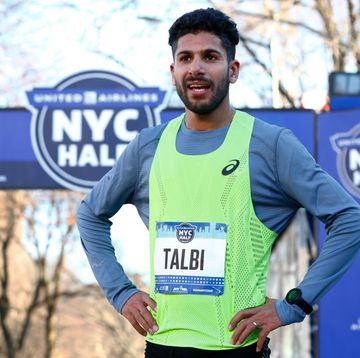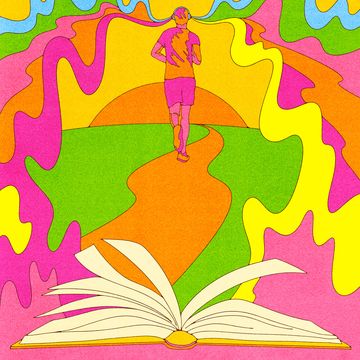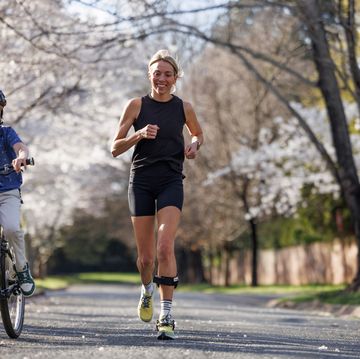If you could eavesdrop on a runner's internal monologue, it might sound like this: Forgot my sunglasses. Pretty bird. Should've worn another layer. What's for dinner? Hill! New shoes feel good. Pasta? Gotta buy pasta. And olive oil. I'm overdressed. I'll do take-out. Dog!
Buddhists call this mental ping-pong game "monkey mind," meaning that the random musings bouncing around your head are like a barrelful of rambunctious primates. It's a natural state for runners who are happy to let their minds wander for miles. But when you become stressed (about an upcoming race or life in general), those monkeys can go bananas. And when they make too much noise (Why did I sign up for this race? My feet hurt! I'm hungry!), it can be tough to perform your best or simply enjoy your run.
Buddhists have a way to tame those animals: meditation. This ancient practice is traditionally done while sitting and focusing on your breathing to achieve peace of mind. But more and more runners are learning how to clear out the commotion while on roads and trails, thanks in part to Sakyong Jamgon Mipham Rinpoche, spiritual leader of a global network of Shambhala Centers (meditation meeting places).
The Sakyong is a dedicated runner (a nine-time marathoner with a 3:05 PR), author of Running with the Mind of Meditation, and founder of a workshop of the same name that is taught in 11 different locations worldwide. "Meditation reduces chaos and stress," the Sakyong says. "When we apply that to running, running becomes a tool that brings relaxation and vitality to the body. By allowing our mind and body to harmonize, we feel more alive and strong." Want in? Just as training for a race requires a gradual buildup, developing a meditative running practice takes time and, well, practice. But by employing some of the basic principles of meditation in your next run, the Sakyong says, you can feel—and run—better instantly.
RELATED: Rejuvenate your running—and your life—at the Runner's World Getaway!
Tune In
The first technique the Sakyong recommends is developing body awareness: Pay attention to how you are breathing, how your feet are landing, how your arms are swinging. If you feel any tense areas (clenched fists or tight shoulders), relax them. But also think about potential causes of the tension. Is it running-related (sore legs from intervals), or is there a lifestyle component (you haven't been sleeping much) as well?
"There is so much value in being able to notice what's happening within your body as you run," says Marty Kibiloski, a 2:23 marathoner who teaches Shambhala running retreats. "We're trained to push through discomfort. But if there is something off that you can correct or at least acknowledge the source of, you can feel more relaxed and run with better form." Which brings big rewards: more efficient running, faster times, fewer injuries. (Sure up your body with this amazing Yoga Workout for Runners.)
Think Happy
Research has linked an optimistic outlook to enhanced athletic ability. In one study, athletes who rated themselves calm and happy before a competition performed better than those who were angry or tense. Nixing negative self-talk is a key principle of meditation. Buddhist teachers tell students to think of pessimistic thoughts as weather patterns moving through the sky: A passing shower, for example, is just that—passing. A. Jesse Jiryu Davis, a 34-year-old New York City web developer, was an experienced meditator when he took up running in 2010. He now taps into his Zen skill set to keep his marathon training positive. "I can see the thoughts coming up while I run—I want to stop right now; I wish this was over—and I see them for what they are," Davis says. "They are just thoughts; they don't have to be my reality."
Accept the Challenge
Monster hills, uncooperative weather, and monotonous long runs can turn an enjoyable experience into a frustrating one—if you allow them to. "Every run has challenges," the Sakyong says. "The challenge is to be brave, not trying to escape boredom or discomfort, but relaxing with how things are." Steve Joseph, a 51-year-old Manhattan lawyer, called upon his meditative training to remain composed at the start of the 2012 Boston Marathon.
While other runners panicked as the temperature rose into the 80s, Joseph sat and focused on his breath. It was a smart strategy in more ways than one. "I was on the ground while everyone else stood around fidgeting. They provided me shade, keeping me cool. And by sitting, I conserved more energy." Joseph stayed calm throughout the race by focusing on his breathing. Runners already have stores of strength and endurance. Meditation can help you recognize these qualities and put them to use, Kibiloski says.
Love the Run
Runners tend to be dissatisfied—with how fast they are, with how far they are able to go. While it's good to want to improve, you also need to value the runner you are today, Kibiloski says. While running, think about all the good you are doing in that moment—strengthening muscles, producing endorphins, taking time for yourself. "Appreciation for running creates a healthy self-identity," the Sakyong says, "no matter what chaos is in your life."













